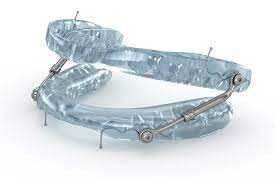Receive state-of-the-art advanced dentistry at Legacy Dental in the friendly, hometown environment that you have known for years.
Advanced Dental Services
Root canals get a bad wrap. But don’t believe the rumors—the dreaded root canal isn’t dreadful at all. Root canals are needed when either decay or an injury infects the inner tooth (the pulp). In the earliest stages of infection, you may not feel any pain at all. But when it progresses, you could have a toothache and swelling or a dental abscess might form. Root canals remove the infection and prevent it from spreading. Thanks to laser root canals, this process is faster, more comfortable and in many cases, more thorough than conventional root canals. Pulp capping is an alternative to root canals that are used when the infection has yet to penetrate the pulp. Pulp capping can also prevent a large dental filling from getting too close to the nerve.
Using dentures to replace missing teeth is not only great for your oral health but it’s a great way to look and feel younger! Today, there are a variety of natural-looking and comfortable dentures for patients who need to replace missing teeth. Made of a gum-colored plastic resin or acrylic base and either resin or porcelain replacement teeth, dentures are custom designed to fit your mouth. If you have several teeth or all teeth missing on the upper or lower jaw, full dentures may be your best option. Partial dentures, which can be either fixed or removable, are great for patients who have several missing teeth scattered along the upper or lower jaw.
The process of getting dentures may take a few months and several dental visits. In some cases, however, same-day dentures are also possible. With same-day dentures, the dentures are created right in the dentist’s office instead of at an offsite laboratory. Same-day dentures aren’t for everyone, though. If your dentures require a lot of customization, same-day dentures may not be right for you.
Just as with your natural teeth, dentures require daily maintenance. With regular wear and tear, your dentures can last five to seven years. During that time, you may need periodic denture relines to accommodate changes in the contours of your mouth. Regular denture relines involve resurfacing the base to ensure that your dentures fit and function perfectly. If you break your dentures, it’s critical to bring them to your dentist for professional denture repair. Home denture repair kits can cause more damage and be even more costly to fix.
Oral surgery is an umbrella term for surgical treatments such as dental implants, wisdom teeth extractions and bone grafting. Dental implants—an excellent solution for missing teeth—are surgically placed tooth roots that hold dental crowns in place. A wisdom tooth extraction may be recommended if there isn’t enough room in your mouth to accommodate wisdom teeth and they become impacted, partially erupted or infected. Bone grafting transfers bone from one part of the jaw to another, usually to accommodate a dental implant. While a general dentist can perform some oral surgery procedures, an oral surgeon is required for others.
If you’re one of the millions of people who have been avoiding regular dental visits due to extreme anxiety about an anticipated dental procedure, we have some great news for you. Our office is offering Sedation Dentistry, also known as “Sleep” Dentistry.
Even though you are not technically asleep during your dental visit, patients describe the experience as seeming to be asleep, which means that they don’t feel or remember the dental procedures, and also have no recollection of the sounds or smells of the dental office, both of which are top triggers for dental fear.
Imagine this—your dentist advises you that you need a filling, crown, root canal or other surgery. You’re feeling apprehensive, so, after a careful medical screening procedure to ensure that you are a good candidate for Sedation Dentistry, we prescribe a small pill for you to take before your dental procedure. You take the pill before your scheduled dental visit, have a friend or family member drive you to our office and, before you know it, your procedure is completed and you haven’t felt a thing! This is the beauty of Sedation Dentistry, anesthesia that allows you to be in a comfortable sleep-like state throughout your dental procedure.
Sedation Dentistry is ideal for patients who are fearful of the dentist or who experience dental anxiety, and also for special needs patients who may have trouble sitting still for an extended period of time. It’s a good option for people who may need to have a number of dental procedures done, who simply can’t keep coming back for multiple appointments and so just want to have all the work done at once. The sedation works for two to eight hours, depending on the amount of dental work you need.
We encourage you to ask us about Sedation Dentistry and how it can help take the anxiety out of your next dental visit.
If you’ve been living with persistent jaw pain, ear pain and headaches, you could have TMJ—temporomandibular jaw disorder. TMJ can often be traced back to an improper bite, misaligned jaw joints or an injury to the jaw or face. TMJ treatment from a dentist can relieve the discomfort. Although TMJ treatment varies from patient to patient, it typically involves one or several procedures, including the use of an orthotic splint, enamel reshaping, dental crowns, dental braces or night guards. The goal of TMJ treatment is to stabilize your bite so that your teeth, jaw muscles and jaw joints work properly together without strain—and without pain!
 Sleep apnea is a serious, potentially life threatening sleep disorder. It is as common as adult diabetes and affects more than 12 million Americans. The Greek work apnea means “want of breath”. Sleep apnea refers to episodes in which a person stops breathing for 10 seconds or more during sleep. With each episode, the sleeper briefly wakes up in order to resume breathing, resulting in extremely fragmented, poor quality sleep.
Sleep apnea is a serious, potentially life threatening sleep disorder. It is as common as adult diabetes and affects more than 12 million Americans. The Greek work apnea means “want of breath”. Sleep apnea refers to episodes in which a person stops breathing for 10 seconds or more during sleep. With each episode, the sleeper briefly wakes up in order to resume breathing, resulting in extremely fragmented, poor quality sleep.
There are three types, all of which can severely disrupt the regular sleep cycle. Obstructive Apnea (OSA) is the most common type and involves the walls of your throat relaxing as you sleep, however in this condition they relax to the point where the airway collapses and prevents air from flowing into the nose and mouth, but efforts to breath continue.
Red, swollen gums are a red flag for one thing: gum disease. If you have the symptoms, you’re not alone. More than 80% of adults have some form of gum disease. Fortunately, there are many effective and pain-free gum disease treatments. For gingivitis, the mildest form of gum disease, treatment typically involves a thorough dental cleaning, followed by daily brushing and flossing. Advanced gum disease—also known as periodontal disease—requires scaling and root planing to remove stubborn deposits below the gum line. Laser gum surgery, a new alternative to scaling and root planing, uses beams of high-speed light to remove plaque and tartar buildup. If non-surgical methods of gum disease treatment are ineffective, a gingivectomy or periodontal surgery may be necessary.
It’s almost impossible to feel confident when you smile if you’re missing teeth. Cosmetic dental implants can change that. With cosmetic dental implants, you get the best in function and aesthetics. Cosmetic dental implants are securely anchored in the jaw bone for maximum comfort and durability. The replacement tooth, or dental crown, is made of tooth-colored porcelain so that your cosmetic dental implants look, feel and function just like your real teeth!
Dental implants can be used to replace a single missing tooth or many. They are a wonderfully permanent alternative to dentures that make the patient feel more confident in his/her teeth. They can also be used to replace just the bottom dentures. This can be a great remedy for those bothersome lower dentures that just don’t want to stay in place.
Need to schedule an appointment?
Call us at (877) 974-7249
